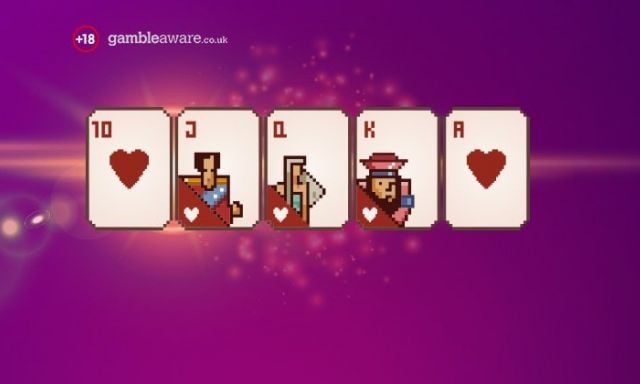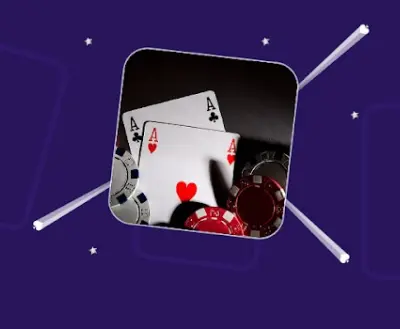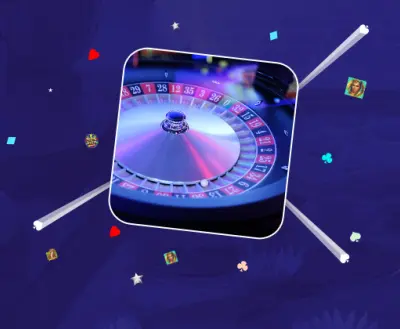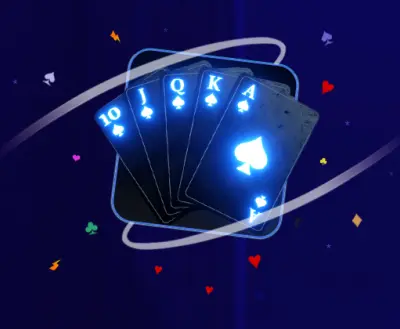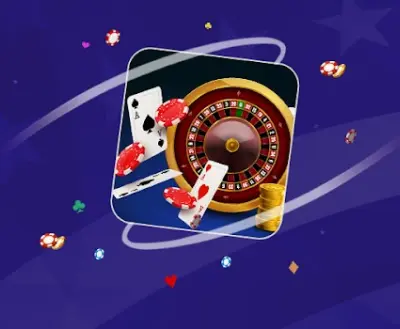Poker has long been an important fixture in the gambling world. Brought to the mainstream with the help of TV coverage of the World Series of Poker, new generations of players across the globe have been switched on to the thrills of poker. No stranger to innovation, the game saw its first major twist back in the 1970s, when Las Vegas casinos pioneered video poker. A sort of hybrid cross between table poker and slot machines, video poker exploded in popularity, and introduced many players to the game for the first time proper.
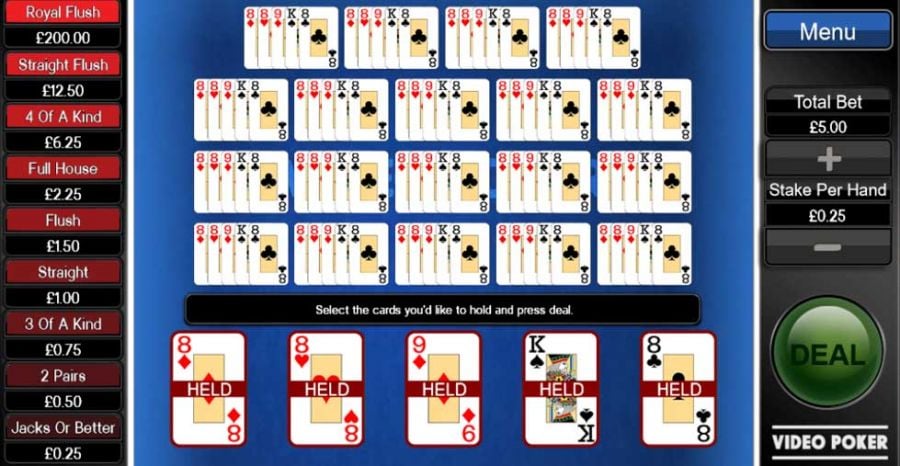
Video poker, as the name suggests, takes place on a console, between the player and the machine. Today, online versions are also available in a number of formats, right here at PartyCasino. The game works in a broadly similar way to standard games, but with fixed payouts and a much faster turnover of hands.
At its most basic, video poker is a digital version of five-card draw. Once you’ve placed your bets on the hand, the game deals you five cards. Your objective is to make the highest ranking hand you can from these five cards. Players have the opportunity to discard and replace any number of their cards in an additional round, before the showdown. As the game doesn’t actually play any hands, you get a straightforward payout relative to the actual value of your hand when the dust settles. The higher ranking your hand, the higher the size of the payout – obviously matched against the size of the stake you are playing on that hand.
Not every hand will payout, and it depends on the specific game rules in play. For example, most games play ‘Jacks or Better’, which means a pair of Jacks would be the minimum qualifying hand for a payment. You can check the payout and any particular rules on the specific game paytable, available from the main menu of whichever video poker game you are choosing.
Some versions of video poker also include twists on the standard game rules, such as Deuces Wild, or Jokers Wild. This essentially means twos or Jokers are wildcards, which can be paired up with your hand to give you a better chance of completing a winning hand combination. Other versions, such as Bonus Poker offer enhanced payments on some combinations, usually Four of a Kind. Some are even progressive, with jackpots mounting up across several games to combine into one massive prize pot. This can also affect the odds, often skewing the game towards positive theoretical payouts when the jackpot is big enough.
The specific payouts and functions of the game vary between different game formats, so it’s important to check the particular game rules ahead of time to get the best read on the game.
Strategy for Video Poker
The actual mechanics of video poker couldn’t be simpler. But it is still important to play with good strategy. There aren’t any competing hands, so you don’t have the same variance effect, but there are still no guarantees you will be able to make a winning hand from even the best starting draw. Aside from understanding the value of hands, and when to ditch versus when to hold, there are a few good strategy points to bear in mind as you start your video poker career.
1. Always Play For Maximum Coins
Video poker games usually allow anywhere from 1 to 5 coins as a starting bet for each hand. When you play for the maximum number of coins, you are often paid out an additional bonus for the best hands. This works over time to give you better odds and a slimmer house edge, even if it is a little more expensive to play through. If you are approaching the game with a view to becoming profitable over time, playing for the maximum coin value will stand you in good stead.
2. Look For Theoretically Positive Game Versions
The unusual thing about video poker is that it’s possible to find games with a negative house edge – in other words, theoretically positive returns to the player. This comes from certain jackpot games, and from some game versions with wilds. These will generally offer you a better deal than machines with an in-built house edge, because you’re not competing on a handicapped basis.
3. It’s All Random – No Card Memory
One of the biggest mistakes video poker players make is to assume that the game must have some element of memory. Video poker is powered by RNGs (random number generators), so you’ll find that the current hand has no relation to the following hand. The games are totally randomised, so you’re never due a good hand or a poor hand, no matter how the hands before you have played. Every hand starts from a clear slate, and has an equal chance of every outcome, as with every hand you play. So it’s important not to get superstitious, or to try to find patterns that simply don’t exist.
4. Be Wary Of Doubling Up
Some games will offer you the chance to double up on certain hands. It’s up to you whether you take this or not, but it’s a good idea to be wary. Are you playing a positive RTP game? Don’t take this – it’s not worth the risk of doubling up, and by doubling up and losing you’re actually reintroducing a wider house edge that could make your session unprofitable. But if you’re keen to maximise your returns on winning hands, or you want to play a more volatile game, it can still be advantageous. Just be sure you’re aware of the risks of this strategy, and the impact it can have on your game odds.
5. Change All Out Lower Cards
It seems a little obvious, but in a jacks or better game, you want to switch out all cards that are not jacks or higher, or already forming part of another hand. A stray 6 is worthless, even if you land a pair with your replaced cards. More times than not, it’s worth being aggressive in switching your cards for another draw, rather than hoping to make a hand out of something that just won’t cut the mustard. For this reason, high value cards are worth even more in video poker than in the real game, because in many cases they will be the only cards capable of earning you a decent payout from the hand. Obviously three of a kind upwards are exceptions, but if you are aggressive in ditching lower value cards that are not paired or capable of forming a better hand, you play the odds more in your favour.

